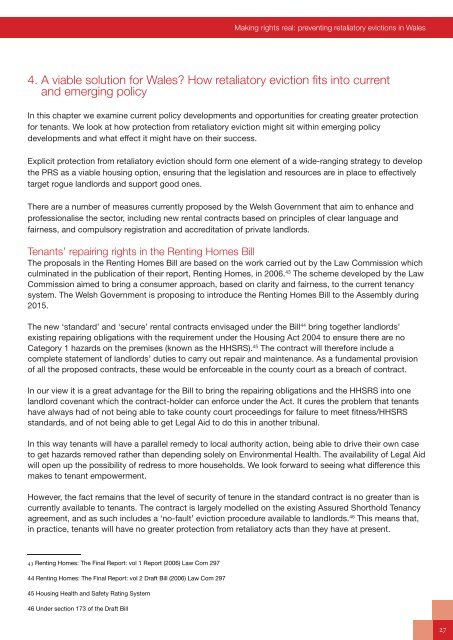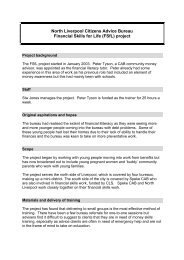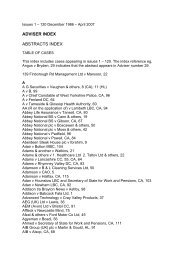Retaliatory eviction - Citizens Advice
Retaliatory eviction - Citizens Advice
Retaliatory eviction - Citizens Advice
Create successful ePaper yourself
Turn your PDF publications into a flip-book with our unique Google optimized e-Paper software.
Making rights real: preventing retaliatory <strong>eviction</strong>s in Wales4. A viable solution for Wales? How retaliatory <strong>eviction</strong> fits into currentand emerging policyIn this chapter we examine current policy developments and opportunities for creating greater protectionfor tenants. We look at how protection from retaliatory <strong>eviction</strong> might sit within emerging policydevelopments and what effect it might have on their success.Explicit protection from retaliatory <strong>eviction</strong> should form one element of a wide-ranging strategy to developthe PRS as a viable housing option, ensuring that the legislation and resources are in place to effectivelytarget rogue landlords and support good ones.There are a number of measures currently proposed by the Welsh Government that aim to enhance andprofessionalise the sector, including new rental contracts based on principles of clear language andfairness, and compulsory registration and accreditation of private landlords.Tenants’ repairing rights in the Renting Homes BillThe proposals in the Renting Homes Bill are based on the work carried out by the Law Commission whichculminated in the publication of their report, Renting Homes, in 2006. 43 The scheme developed by the LawCommission aimed to bring a consumer approach, based on clarity and fairness, to the current tenancysystem. The Welsh Government is proposing to introduce the Renting Homes Bill to the Assembly during2015.The new ‘standard’ and ‘secure’ rental contracts envisaged under the Bill 44 bring together landlords’existing repairing obligations with the requirement under the Housing Act 2004 to ensure there are noCategory 1 hazards on the premises (known as the HHSRS). 45 The contract will therefore include acomplete statement of landlords’ duties to carry out repair and maintenance. As a fundamental provisionof all the proposed contracts, these would be enforceable in the county court as a breach of contract.In our view it is a great advantage for the Bill to bring the repairing obligations and the HHSRS into onelandlord covenant which the contract-holder can enforce under the Act. It cures the problem that tenantshave always had of not being able to take county court proceedings for failure to meet fitness/HHSRSstandards, and of not being able to get Legal Aid to do this in another tribunal.In this way tenants will have a parallel remedy to local authority action, being able to drive their own caseto get hazards removed rather than depending solely on Environmental Health. The availability of Legal Aidwill open up the possibility of redress to more households. We look forward to seeing what difference thismakes to tenant empowerment.However, the fact remains that the level of security of tenure in the standard contract is no greater than iscurrently available to tenants. The contract is largely modelled on the existing Assured Shorthold Tenancyagreement, and as such includes a ‘no-fault’ <strong>eviction</strong> procedure available to landlords. 46 This means that,in practice, tenants will have no greater protection from retaliatory acts than they have at present.43 Renting Homes: The Final Report: vol 1 Report (2006) Law Com 29744 Renting Homes: The Final Report: vol 2 Draft Bill (2006) Law Com 29745 Housing Health and Safety Rating System46 Under section 173 of the Draft Bill27




![Annual review [ 1.4 MB] - Citizens Advice](https://img.yumpu.com/50679529/1/190x135/annual-review-14-mb-citizens-advice.jpg?quality=85)

![Help for helping your residents [ 2.4 MB] - Citizens Advice](https://img.yumpu.com/48848542/1/185x260/help-for-helping-your-residents-24-mb-citizens-advice.jpg?quality=85)







